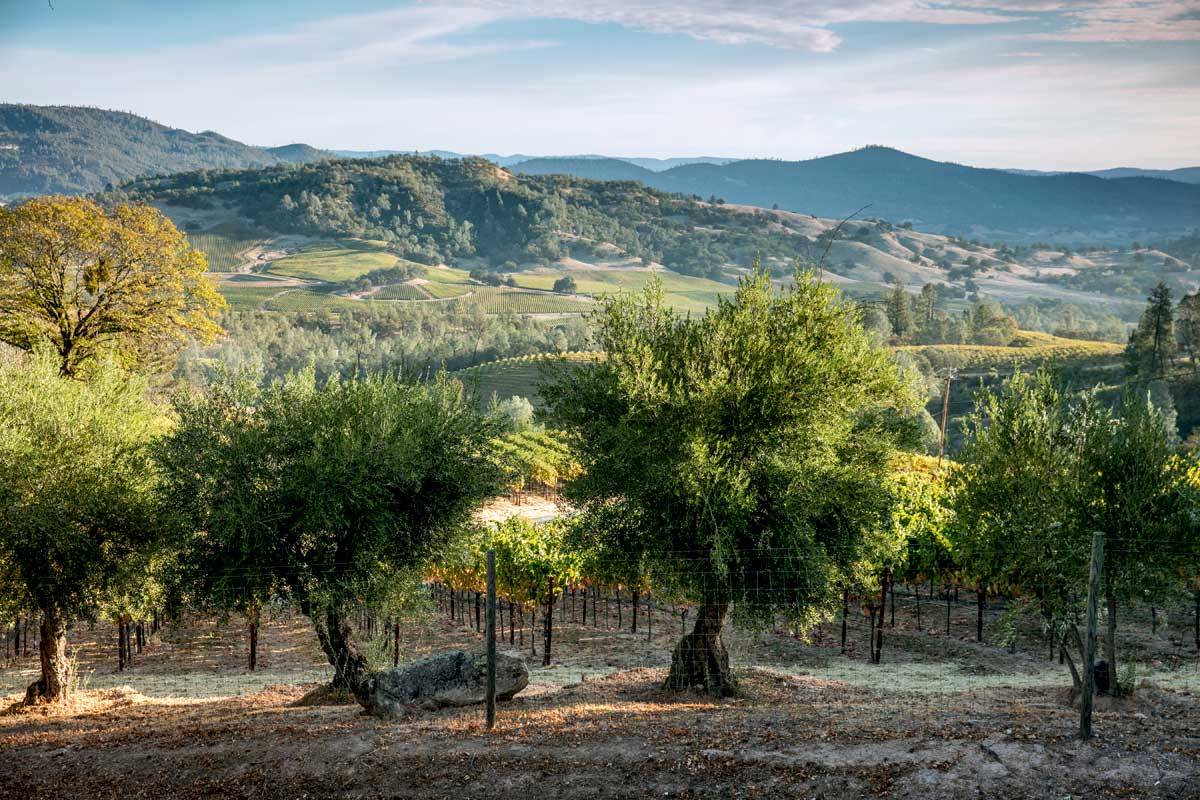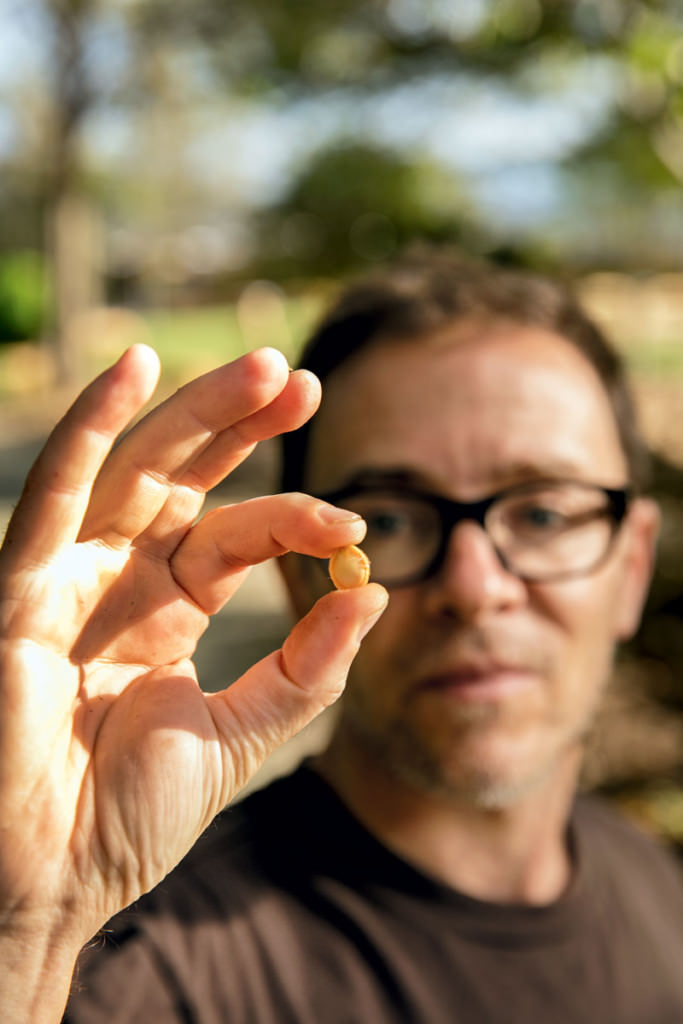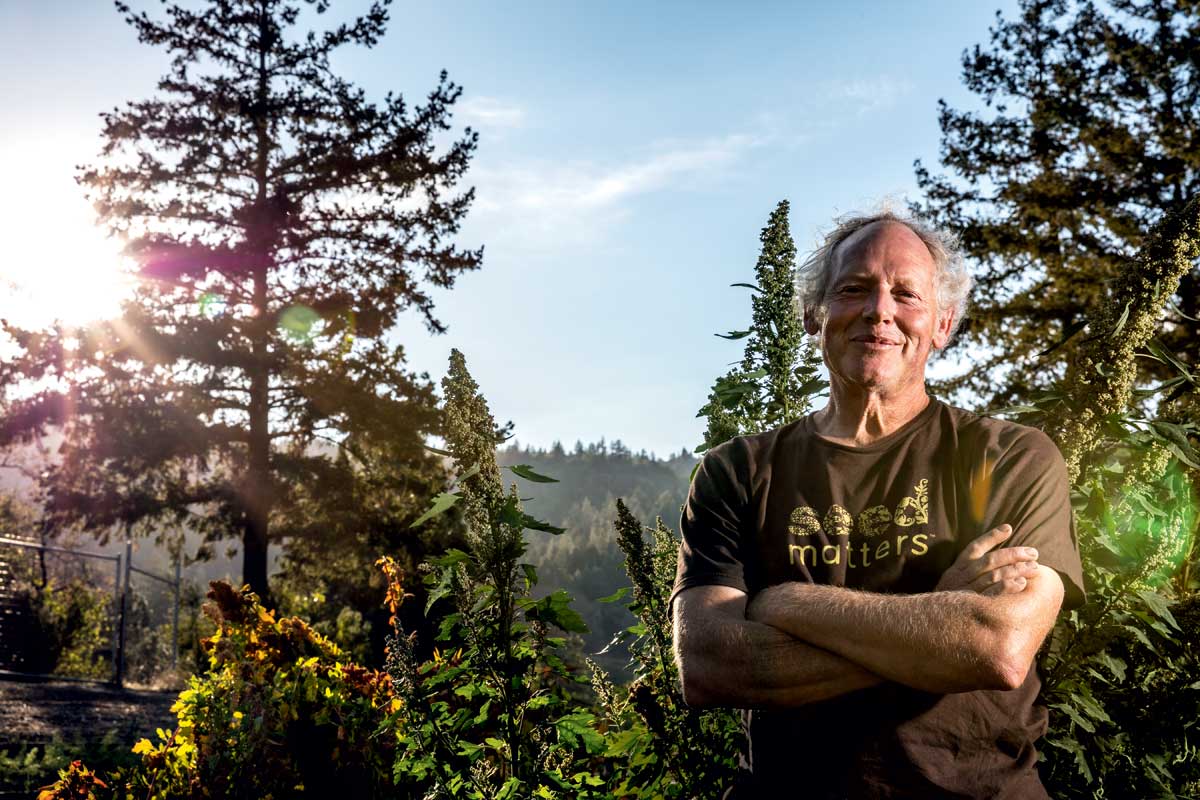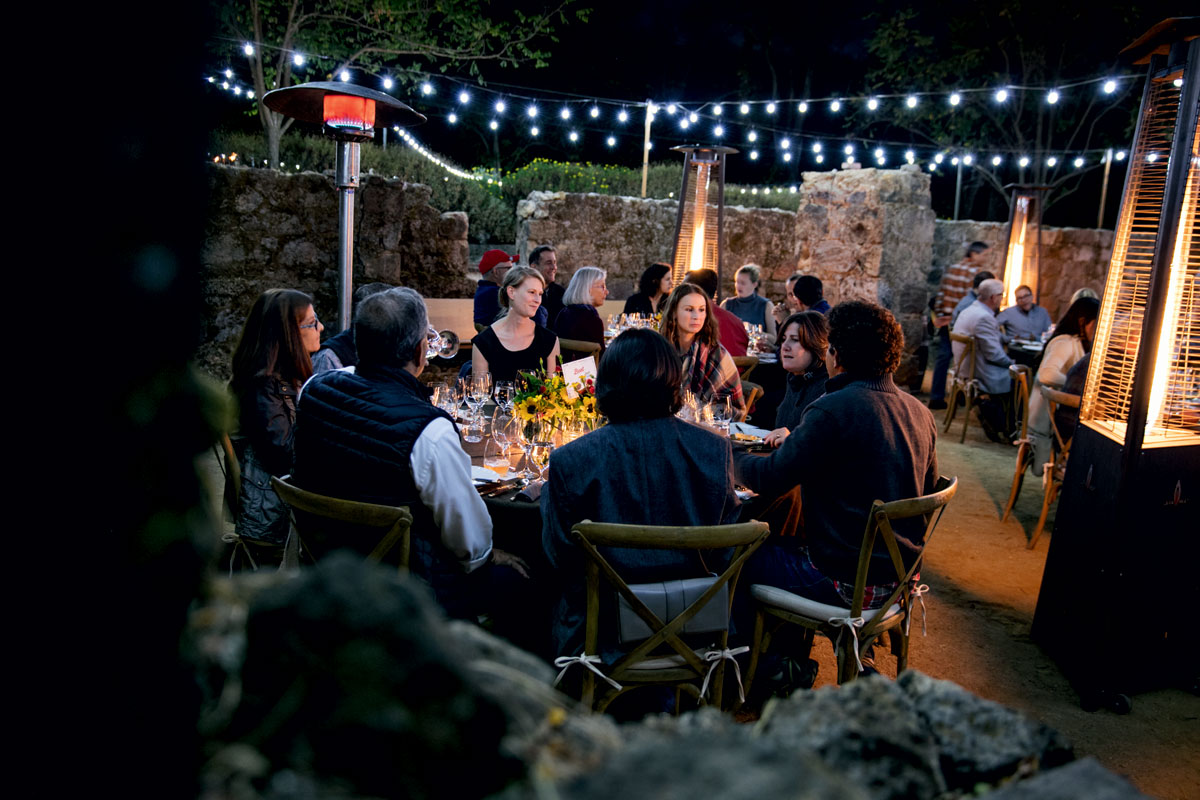The Outsize Importance of the Tiny Organic Seed
A benefit in California wine country honors our nation’s public plant breeders – by putting their work on a plate.
The Outsize Importance of the Tiny Organic Seed
A benefit in California wine country honors our nation’s public plant breeders – by putting their work on a plate.

Parsley. Frank Morton is talking about parsley, possibly the least sexy, most maligned herb imaginable, often relegated to the role of garnish. And he’s excited.
“Parsley could be the new kale. You laugh, but I might make this happen,” says the owner of Wild Garden Seed, who’s spent much of the past 30-odd years living off the grid in Philomath, Oregon, where he breeds new lettuces, quinoas, and other edible plants. Morton is currently experimenting with parsley samples from around the world, sending them to chef-friends for taste testing, in the hopes of creating exceptionally flavorful, hardy varieties that won’t bolt prematurely.
Tonight, one of those parsleys, a flat-leaf from the Republic of Georgia, has migrated from the edge of the plate to headline a granita prepared by Matthew Accarrino of San Francisco’s Michelin-starred SPQR. The occasion: a dinner at the St. Helena, California, farm of Kit Crawford and her husband, Gary Erickson, who founded Clif Bar & Company. The event, benefiting Seed Matters (an initiative of the couple’s nonprofit Clif Bar Family Foundation), aims to push the now-ubiquitous farm-to-table fundraiser a few levels deeper.

“The problem with the farm-to-table thing,” explains Matthew Dillon, who oversees Seed Matters as the director of Clif Bar’s agricultural policy and programs, “is that it jumps into the story halfway.” Long before a sprig of parsley or an ear of corn is harvested – much less cooked and eaten – the right seed must be planted. And the outlook for the people who do the work of developing that all-important source material? Bleak, at best.
During the past century, as agriculture has become more and more industrialized, flavor and genetic diversity have been sacrificed in favor of efficiency and yield. The result, says Cornell University professor Michael Mazourek, is the bland, “one-size-fits-most crops” that dominate today’s culinary landscape. He is among the plant breeders gathered in St. Helena to showcase the work of Seed Matters, which helps fund his research. Mazourek’s chile peppers, including the ‘Habanada’ – “It’s a habanero without the blistering heat. Get it?” – were paired with burrata cheese for an appetizer. “But this is not just about what we’re eating now,” says the scientist, who teamed with New York chef Dan Barber to create the squat ‘Honeynut’ squash. “It’s about what we’re leaving for future generations to build upon.”
Unfortunately, the seed business has consolidated in a few corporate hands over the years, and the Monsantos and Syngentas of the world patent their proprietary horticultural product. That’s why Clif Bar underwrites university endowments, fellowships, and grants, supporting the kind of public research that produces open-source varieties any breeder can access. Seed Matters also emphasizes the importance of organic methods. “Seeds created in a conventional, chemically dependent environment,” Dillon explains, “yield far less resilient plants.”
Another downside of privatization: Corporate control has given plant breeding a bad rap. “People think it means ‘genetically engineered,’” says Lane Selman, a researcher at Oregon State University and the founder of the Culinary Breeding Network, which connects breeders and chefs. “The heirloom boom of the nineties helped people see the value of preserving seed, but they don’t understand that it can get even better.” Traditional breeding methods, she says, hit the sweet spot between heirlooms and GMOs, producing flavorful, nutrient-rich edibles that are also disease resistant. “We want to show that plant sex is not a four-letter word.”
Bill Tracy certainly doesn’t shy away from the subject. “Corn is extremely promiscuous. We have to keep our plants isolated to prevent cross-pollination,” says the University of Wisconsin”“Madison professor and one of only two public sweet-corn breeders in the United States. He and the other scientists at the Seed Matters benefit – Jim Myers of Oregon State University, Washington State University’s Stephen Jones, and Irwin Goldman of the University of Wisconsin”“Madison – represent our nation’s best hope for better-tasting food. It would be hard, in fact, to underestimate the collective brainpower gathered here under an autumn sky. Thao Pham, the vice president of community at Clif Bar, jokes: “We are in earthquake territory. What if something happens?”


“Public plant breeding was on life support for a while,” says Tracy, whose ‘Who Gets Kissed?’ corn starred in a creamy gelato accompanying a cake made with Myers’s ‘Tromboncino’ squash. Preceding the dessert: sublime gnudi created by John McConnell, executive chef at the Clif Family Winery, that incorporated Mazourek’s ‘Honeynut’ squash and Morton’s ‘Lacinato Rainbow’ kale. Chef Accarrino served Goldman’s Danvers and Nantes carrots four different ways: roasted, raw, puréed, and pan-fried.
If the festive atmosphere tonight is any indication, Seed Matters is breathing new life into traditional plant breeding. Morton, for one, says he’s noticed a great deal of enthusiasm among the next generation. “They’re realizing seed is just so primary. There used to be clubs for people who saved seeds,” he adds. “You don’t hear about them nowadays, but I could see it catching on in a second.”
VIDEO: How the Clif Bar Family Foundation showcased the work of the plant breeders the program supports at a benefit dinner:
[mf_image_grid_item src=”https://modernfarmer.com/wp-content/uploads/2015/12/seed-matters-packets.jpg” alt=”usda gene bank system” title=””]The USDA’s gene bank system provided Morton with parsley germplasm from around the world.[/mf_image_grid_item]
[mf_image_grid_item src=”https://modernfarmer.com/wp-content/uploads/2015/12/seed-matters-kit-crawford-gary-erickson.jpg” alt=”kit crawford and gary erickson” title=””]Kit Crawford (left) and Gary Erickson founded the Clif Bar Family Foundation to support groups working on food and environmental issues. [/mf_image_grid_item]
[mf_image_grid_item src=”https://modernfarmer.com/wp-content/uploads/2015/12/seed-matters-flat-leaf-parsley-2.jpg” alt=”flat leaf parsley” title=””]Frank Morton sent this flat-leaf parsley from the Republic of Georgia, and others he’s experimenting with, to chef-friends for taste testing.[/mf_image_grid_item]
[mf_image_grid_item src=”https://modernfarmer.com/wp-content/uploads/2015/12/seed-matters-granita.jpg” alt=”parsley granita” title=””]The Georgian parsley flavored a palate-cleansing granita, prepared by Matthew Accarrino, the chef at SF’s SPQR.[/mf_image_grid_item]
[mf_image_grid_item src=”https://modernfarmer.com/wp-content/uploads/2015/12/seed-matters-bill-tracy.jpg” alt=”bill-tracy” title=””]Bill Tracy, chair of the agronomy department at the University of Wisconsin-Madison, stands in a field of Clif Floriani Red Flint corn.[/mf_image_grid_item]
[mf_image_grid_item src=”https://modernfarmer.com/wp-content/uploads/2015/12/seed-matters-gelato1.jpg” alt=”who gets kissed corn gelato” title=””]A creamy gelato sweetened by Tracy’s ‘Who Gets Kissed?’ corn accompanied a cake made with ‘Tromboncino’ squash, bred by Jim Myers of Oregon State.[/mf_image_grid_item]
[mf_image_grid_item src=”https://modernfarmer.com/wp-content/uploads/2015/12/seed-matters-irwin-goldman.jpg” alt=”irwin goldman title=””]Irwin Goldman, chair of the horticulture department at the University of Wisconsin-Madison, specializes in beets and carrots. [/mf_image_grid_item]
[mf_image_grid_item src=”https://modernfarmer.com/wp-content/uploads/2015/12/seed-matters-roasted-carrots-1.jpg” alt=”roasted carrots” title=””]Chef Matthew Accarrino incorporated Irwin Goldman’s work in this dish of roasted carrots with a falafel-like carrot-top frittelle.[/mf_image_grid_item]
[mf_image_grid_item src=”https://modernfarmer.com/wp-content/uploads/2015/12/seed-matters-tomatoes-1.jpg” alt=”tomatoes” title=””]Tomatoes from Jim Myers’s Indigo series contain high levels of the antioxidant anthocyanin.[/mf_image_grid_item]
[mf_image_grid_item src=”https://modernfarmer.com/wp-content/uploads/2015/12/seed-matters-jim-myers1.jpg” alt=”jim myers” title=””]Jim Myers, a professor at Oregon State University, has built a career around beans and tomatoes.[/mf_image_grid_item]
[mf_image_grid_item src=”https://modernfarmer.com/wp-content/uploads/2015/12/seed-matters-lane-selman1.jpg” alt=”lane selman” title=””]Lane Selman, an agricultural researcher at Oregon State, founded Portland’s Culinary breeding Network to foster collaboration among chefs and plant breeders.[/mf_image_grid_item]
[mf_image_grid_item src=”https://modernfarmer.com/wp-content/uploads/2015/12/seed-matters-chile-peppers1.jpg” alt=”chile peppers” title=””]Guests were encouraged to consider the bouquets of mild chile peppers (bred by Jim Myers and Michael Mazourek) before biting into them.[/mf_image_grid_item]
[mf_image_grid_item src=”https://modernfarmer.com/wp-content/uploads/2015/12/seed-matters-stephen-jones.jpg” alt=”stephen jones” title=””]Stephen Jones, a professor at Washington State University, founded the school’s Bread Lab, where his team researches all things wheat related. [/mf_image_grid_item]
[mf_image_grid_item src=”https://modernfarmer.com/wp-content/uploads/2015/12/seed-matters-matthew-dillon-full1.jpg” alt=”matthew dillon” title=””]Before joining Clif Bar & Company as its director of agricultural policy and programs, Matthew Dillon served as executive director of the Organic Seed Alliance.[/mf_image_grid_item]
[mf_image_grid_item src=”https://modernfarmer.com/wp-content/uploads/2015/12/seed-matters-gnudi.jpg” alt=”gnudi” title=””]John McConnell, executive chef at the Clif Family Winery, crafted this gnudi from Mazourek’s ‘Honeynut’ squash and several of Frank Morton’s peppers and his ‘Lacinato Rainbow’ kale.[/mf_image_grid_item]
[mf_image_grid_item src=”https://modernfarmer.com/wp-content/uploads/2015/12/seed-matters-michael-mazourek.jpg” alt=”matthew mazourek” title=””]Matthew Mazourek, a professor at Cornell University, carries a crate of ‘Honeynut’ squash, which he developed in collaboration with New York chef Dan Barber.[/mf_image_grid_item]
VIDEO: Meet Matthew Dillon, who oversees the Clif Bar Family Foundation’s “Seed Matters” initiative:
VIDEO: Meet plant breeder Frank Morton:
VIDEO: Meet chef Matthew Accarrino from San Francisco’s SPQR:
Follow us

This work is licensed under a Creative Commons Attribution-NoDerivatives 4.0 International License.
Want to republish a Modern Farmer story?
We are happy for Modern Farmer stories to be shared, and encourage you to republish our articles for your audience. When doing so, we ask that you follow these guidelines:
Please credit us and our writers
For the author byline, please use “Author Name, Modern Farmer.” At the top of our stories, if on the web, please include this text and link: “This story was originally published by Modern Farmer.”
Please make sure to include a link back to either our home page or the article URL.
At the bottom of the story, please include the following text:
“Modern Farmer is a nonprofit initiative dedicated to raising awareness and catalyzing action at the intersection of food, agriculture, and society. Read more at <link>Modern Farmer</link>.”
Use our widget
We’d like to be able to track our stories, so we ask that if you republish our content, you do so using our widget (located on the left hand side of the article). The HTML code has a built-in tracker that tells us the data and domain where the story was published, as well as view counts.
Check the image requirements
It’s your responsibility to confirm you're licensed to republish images in our articles. Some images, such as those from commercial providers, don't allow their images to be republished without permission or payment. Copyright terms are generally listed in the image caption and attribution. You are welcome to omit our images or substitute with your own. Charts and interactive graphics follow the same rules.
Don’t change too much. Or, ask us first.
Articles must be republished in their entirety. It’s okay to change references to time (“today” to “yesterday”) or location (“Iowa City, IA” to “here”). But please keep everything else the same.
If you feel strongly that a more material edit needs to be made, get in touch with us at [email protected]. We’re happy to discuss it with the original author, but we must have prior approval for changes before publication.
Special cases
Extracts. You may run the first few lines or paragraphs of the article and then say: “Read the full article at Modern Farmer” with a link back to the original article.
Quotes. You may quote authors provided you include a link back to the article URL.
Translations. These require writer approval. To inquire about translation of a Modern Farmer article, contact us at [email protected]
Signed consent / copyright release forms. These are not required, provided you are following these guidelines.
Print. Articles can be republished in print under these same rules, with the exception that you do not need to include the links.
Tag us
When sharing the story on social media, please tag us using the following: - Twitter (@ModFarm) - Facebook (@ModernFarmerMedia) - Instagram (@modfarm)
Use our content respectfully
Modern Farmer is a nonprofit and as such we share our content for free and in good faith in order to reach new audiences. Respectfully,
No selling ads against our stories. It’s okay to put our stories on pages with ads.
Don’t republish our material wholesale, or automatically; you need to select stories to be republished individually.
You have no rights to sell, license, syndicate, or otherwise represent yourself as the authorized owner of our material to any third parties. This means that you cannot actively publish or submit our work for syndication to third party platforms or apps like Apple News or Google News. We understand that publishers cannot fully control when certain third parties automatically summarize or crawl content from publishers’ own sites.
Keep in touch
We want to hear from you if you love Modern Farmer content, have a collaboration idea, or anything else to share. As a nonprofit outlet, we work in service of our community and are always open to comments, feedback, and ideas. Contact us at [email protected].by Rachel Levin, Modern Farmer
December 15, 2015
Modern Farmer Weekly
Solutions Hub
Innovations, ideas and inspiration. Actionable solutions for a resilient food system.
ExploreExplore other topics
Share With Us
We want to hear from Modern Farmer readers who have thoughtful commentary, actionable solutions, or helpful ideas to share.
SubmitNecessary cookies are absolutely essential for the website to function properly. This category only includes cookies that ensures basic functionalities and security features of the website. These cookies do not store any personal information.
Any cookies that may not be particularly necessary for the website to function and are used specifically to collect user personal data via analytics, ads, other embedded contents are termed as non-necessary cookies.